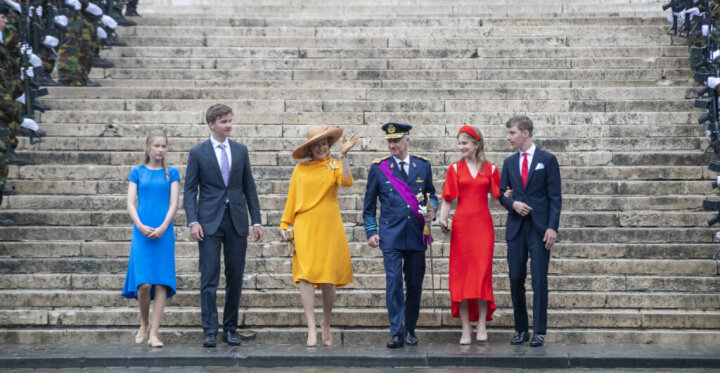The 21st July
Belgian National Day was originally celebrated on 27th September, the date of the expulsion of the Dutch forces from Brussels during the revolutionary "September Days" anno 1830 in the southern provinces of the Low Countries. In 1890 it was changed by law, however, to 21st July to strengthen the association between the newly established monarchy and the constitutional order. On this day in 1831, King Leopold I took the constitutional oath, to become the first king of Belgium.
Leopold I reigned from 21st July 1831 until his death in 1865. The youngest son of Francis, Duke of Saxe-Coburg-Saalfeld, Leopold took a commission in the Imperial Russian Army and fought against Napoleon after French troops overran Saxe-Coburg during the Napoleonic Wars. After Napoleon's defeat, Leopold moved to the United Kingdom, where in 1816 he married Princess Charlotte of Wales, the only child of the Prince Regent (the future King George IV). Leopold and Charlotte's marriage was happy, but it ended after a year and a half when Charlotte died after delivering a stillborn son. Leopold continued to enjoy considerable status in Britain.
The provisional Belgian National Congress offered the open position according to their newly created constitution for their country to Leopold because of his diplomatic connections with royal houses across Europe, and because as the British-backed candidate, he was not affiliated with other powers, such as France, which were believed to have territorial ambitions in Belgium which might threaten the European balance of power created by the 1815 Congress of Vienna.
Leopold I advocated a much more authoritarian interpretation of the Constitution ('the King appoints his ministers, not the parties'). His son, the infamous Leopold II of Congo Free State fame, followed in his footsteps and from the very beginning blamed the political parties for having lost the idea of national interest. But yes, unlike his father again, Leopold II made his discontent public.
A National Day highlight is the military and civilian parade, for which rehearsals took place several days beforehand. It will take place between 4 and 6 o'clock in the Place des Palais, and visitors are invited to watch the parade from the Rue Royale, starting from Boulevard du Jardin Botanique.
Leve de Koning,
Leve België
Leopold I reigned from 21st July 1831 until his death in 1865. The youngest son of Francis, Duke of Saxe-Coburg-Saalfeld, Leopold took a commission in the Imperial Russian Army and fought against Napoleon after French troops overran Saxe-Coburg during the Napoleonic Wars. After Napoleon's defeat, Leopold moved to the United Kingdom, where in 1816 he married Princess Charlotte of Wales, the only child of the Prince Regent (the future King George IV). Leopold and Charlotte's marriage was happy, but it ended after a year and a half when Charlotte died after delivering a stillborn son. Leopold continued to enjoy considerable status in Britain.
The provisional Belgian National Congress offered the open position according to their newly created constitution for their country to Leopold because of his diplomatic connections with royal houses across Europe, and because as the British-backed candidate, he was not affiliated with other powers, such as France, which were believed to have territorial ambitions in Belgium which might threaten the European balance of power created by the 1815 Congress of Vienna.
Leopold I advocated a much more authoritarian interpretation of the Constitution ('the King appoints his ministers, not the parties'). His son, the infamous Leopold II of Congo Free State fame, followed in his footsteps and from the very beginning blamed the political parties for having lost the idea of national interest. But yes, unlike his father again, Leopold II made his discontent public.
A National Day highlight is the military and civilian parade, for which rehearsals took place several days beforehand. It will take place between 4 and 6 o'clock in the Place des Palais, and visitors are invited to watch the parade from the Rue Royale, starting from Boulevard du Jardin Botanique.
Leve de Koning,
Leve België



